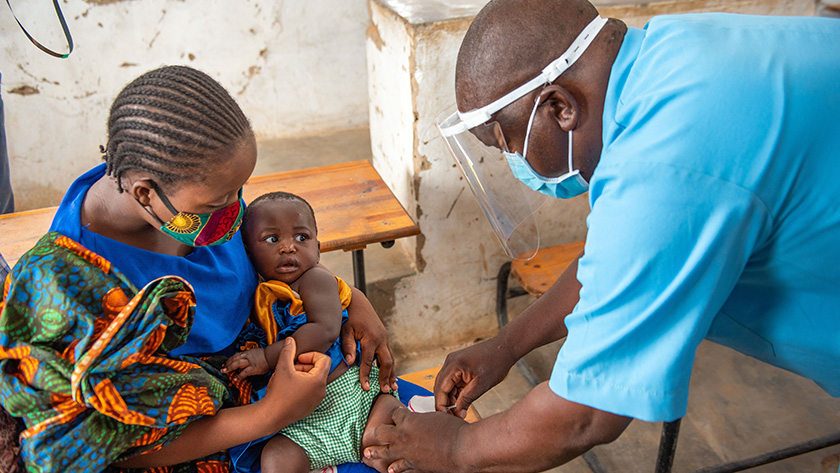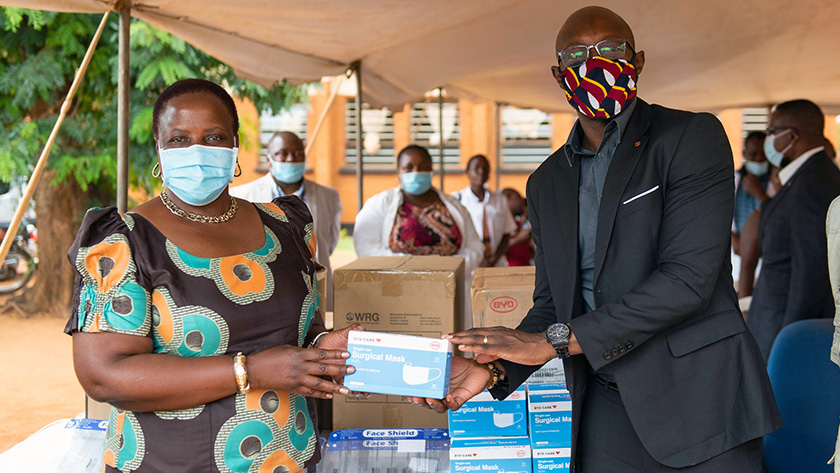Alinafe Kasiya, the Malawi Deputy Country Director at VillageReach, discusses the impact of CAF-Africa in Malawi on the Skoll Foundation’s recent blog
By Alinafe Kasiya – VillageReach
No health worker should have to choose between treating their patients and keeping themselves and their families safe. However, as the global shortage and inequitable distribution of personal protective equipment (PPE) continues, many health workers face this choice.
This reality is especially true for community health workers (CHWs) in low-and middle-income countries. Despite playing a central role in delivering essential health services, CHWs are often the last to receive PPE. For two Malawian CHWs, Raphael Salanga and Reuben Chipelesa, known as Health Surveillance Assistants (HSAs), choosing between protecting themselves or serving their communities happens on a daily basis.
“We are very passionate about serving our community,” Chipelesa said. “(We provide) care and support so that people do not die from unnecessary deaths, even at the expense of endangering our own lives.”
So, in October 2020, when PPE came to their community, Salanga and Chipelesa were relieved. Over 10,000 HSAs across 28 health districts in Malawi received a donation of over 2 million pieces of PPE (including face masks and face shields) from the COVID-19 Action Fund for Africa (CAF-Africa). The initiative is the only known effort to protect CHWs like Salanga and Chipelesa, and a recent donation by the Skoll Foundation will help CAF-Africa equip CHWs with PPE to serve their communities safely, both now and in the future.
Protecting Malawi’s CHWs
Before the COVID-19 pandemic struck, Salanga held monthly village clinics in Nkhotakota district to increase community access to family planning, health education, child growth monitoring, and under-five immunizations. But without PPE, Salanga and Chipelesa worried about continuing this clinic and regular services without protection. Chipelesa noted they sometimes only had access to one face mask for the day and no surgical gloves to protect themselves. Nkotakota district was one of the first rural districts in Malawi to document a COVID-19 case in May 2020.
As the backbone of Malawi’s primary health care system, HSAs know that without their services Malawians will not have access to vaccines and life-saving medicines. That’s why many HSAs kept working, even without PPE. When HSAs can not provide health services in the community, many Malawians must walk upwards of 20km to the nearest health center.
Working closely with the Ministry of Health and Population, VillageReach, Last Mile Health, and CAF-Africa partners, began planning and distributing PPE to protect Malawi’s HSAs this spring. Planning for PPE arrival required solving logistical challenges, including storage limitations (for products that filled 8 shipping containers and weighed nearly 28,000 kg), budget constraints, and distribution hurdles to get PPE to HSAs across the country.
In a ceremony to celebrate the CAF-Africa PPE donation on November 30, the Malawi Minister of Health, the Honorable Khumbize Kandodo Chiponda, MP said, “The Ministry of Health respects the focus of CAF-Africa on providing PPEs for community health care workers….the availability of PPEs allows the HSAs to not only play an active role in COVID-19 National Response, but also maintain other essential health services during the pandemic.”
Now with donated PPE, Salanga and Chipelesa can do the jobs they love—safely.
New Funding equals more support for CHWs
For CHWs serving remote communities, limited access to PPE and other health products is not a problem that began—nor will end—with COVID-19. CAF-Africa has helped procure and distribute PPE to 12 African countries thus far, but beyond this pandemic CHWs need reliable access to PPE and health products to serve their communities.
The Skoll Foundation’s recent $1 million donation will help address this problem. This funding will allow CAF-Africa to work more closely with country and regional partners to recognize CHWs as essential health workers who must be included in future supply chain planning.
“Our passion as community health workers is to see that people are helped right here in the community,” Chipelesa said. “We want people to know that we stand with them for a healthy community.”
Salanga and Chipelesa both said even without reliable access to PPE they will not stop serving their communities, even at the “expense of their own lives.”
But as we weather the storm of this pandemic and prepare for the next, we must ask ourselves: should they really have to?


